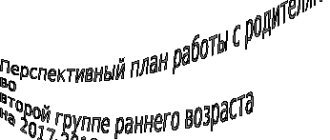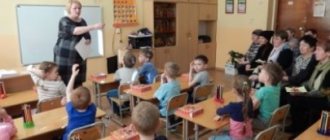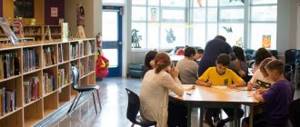When to talk to a student
This is one of the most famous teaching and educational methods used in the learning process. The main task is to encourage the student to pay more attention to the educational process or extracurricular activities.
- introductory;
- giving new knowledge;
- fixing;
- control and corrective.
Used for educational purposes, it is called ethical. The task is to evaluate actions, events, facts of life and, on their basis, develop a certain attitude towards the world around us, towards the student’s own moral and civic responsibilities.
Sample of a preventive conversation with parents of students
If earlier teachers considered the process of education in the form of a kind of triangle: school - parents - child, where the school, in close cooperation with parents, since the moral and social guidelines coincided, successfully solved the problem of education, then, unfortunately, today the school often remains in this triangle without the support of the second, parental side.
Over the past five to ten years, there has been a process of lowering the age limit for offenders.
Understand yourself and your child” Improving the pedagogical culture of parents, replenishing their arsenal of knowledge on the specific issue of raising a child in the family; development of collective decisions and uniform requirements for raising children, integration of the efforts of families and teachers in activities to develop the child’s personality; promoting the experience of successful family education, preventing incorrect actions towards families on the part of parents; planning the work of joint activities of teachers, students and parents. Dispute “Why is my child becoming difficult?” A difficult child is a child who finds it difficult, a difficult child through the eyes of adults, why a child becomes difficult, the reasons for children’s uncontrollability, for which the child takes revenge.
First school grades. ATTENTION TO TEACHERS: Do you want to organize and lead a mental arithmetic club at your school? The demand for this technique is constantly growing, and to master it, you will only need to take one advanced training course (72 hours) directly in your personal account on the Infourok website. After completing the course you will receive: - Certificate of advanced training; — Detailed lesson plan (150 pages); — Problem book for students (83 pages); — Introductory notebook “Introduction to accounts and rules”; — FREE access to the CRM system, Personal account for conducting classes; — Possibility of an additional source of income (up to 60,000 rubles.
RU"You should not start a conversation with the following phrases:
- Your child has completely stopped studying and does nothing.
- Your child is doing very badly.
- Just think about it, exams are coming soon, but yours won’t pass.
Constructing a conversation with parents:
- talk about the child’s current situation, highlight all the possible positive aspects that you can find.
- Let us state the situation: there are some difficulties and problems that interfere.
- thank your parent for coming (it doesn’t matter whether he works or sits at home and appears only after the fifth invitation)
- express the hope that through joint efforts it will be possible to cope with the difficulties that have arisen
When is a meeting with parents necessary?
Parents are invited to a meeting when it is necessary to combine the efforts of the school and family to correct the child’s behavior or academic performance. Working together with the child’s family, the teacher solves the following problems:
- organizing pedagogical assistance in education;
- progress monitoring;
- receiving assistance in organizing and conducting school events.
Individual conversation is the most effective way to work. In the process, you can establish contact and jointly find ways to influence the child. Protocols of conversations with students’ parents record the communication process, questions that arise and answers to them.
The act of individual conversation with the student’s parents
12+ EL No. FS 77 - 70917 for educational activities No. 0001058 Pedagogical community
Methodological developmentsCompetitionsDiscussionsParticipantsCoursesCertification ▪▪Material published by 605Russia, Bashkir Republic.Material posted in group 2
File size: 59 KB Here is a conversation with the parents of 6th grade student Anton Dorogin. The conversation took place over the phone. The student’s mother, Elena Aleksandrovna, was notified of her son’s lateness to classes. The family has no supporting documents. Elena Alexandrovna promised to carry out educational work with her son. Date of call 9.09.
2016 13:15 Signature of the class teacher/_____________/ Act of the conversation with the parents of 8th grade student Evgeniy Sidorov. The conversation took place over the phone. The student’s mother, Nadezhda Maksimovna, was informed that her son was unprepared for the literature lesson.
The child has no valid reasons.
Nadezhda Maksimovna promised to carry out educational work with her son. The date of the call is September 15. 2020 16:10Signature of the class teacher/_____________/ Published on 01/19/17 at 14:49 in the group To write a comment you must. For class teachersWebinarWebinarWebinarAdvanced training courseWebinar Materials on topics Authors on topic 387Teacher, Head of methodological association923Teacher1696Primary school teacher1019Teacher of Russian language and literature347Teacher
Rules
Individual communication is a difficult option, because in the process problems related to violations of discipline and conflicts are resolved. The method is divided into stages:
- The teacher justifies the topic for discussion.
- Material for discussion is provided (extract from the journal, story about the incident).
- Teacher questions that help you express your opinion, generalize and draw conclusions.
- Formulating a solution to the problem.
The rules of the event are as follows. Conversation:
- must be of a problematic nature;
- help find answers to problematic questions;
- do not turn into a lecture when only the teacher speaks;
- give the opportunity to honestly express your opinion;
- identify existing opinions;
- help you draw the right conclusion.
It is advisable to hold meetings outside of class.
Who compiles them and when?
The protocol of an individual conversation with the parents of a low-performing student and others become a document:
- primary, helping to demand the implementation of the activities mentioned in it;
- acquittal - in conflict situations.
It is drawn up in free form. You need to provide information about:
- issues that were discussed;
- proposals;
- developed solutions.
The teacher who conducts the meeting draws up a protocol.
Working with parents and social partners
Information and analytical reference.
Work with parents and social partners.
Lukinykh G.I.,
Physics teacher MAOU "Secondary School No. 44"
I believe that the effectiveness and efficiency of working with parents is determined through a clearly organized system of teacher work.
Purpose of activity:
Increasing the responsibility of parents for the educational process of their children and obtaining a positive result of the educational process through deepening and expanding forms of interaction and cooperation.
Tasks:
1. Study the families of students and the conditions for raising a child in the family.
2. Involve parents in children’s educational activities and extracurricular activities.
3. Contribute to the formation of trusting and friendly relationships between parents and children, teachers and parents.
To solve the assigned tasks, the work is organized in the following areas:
Psychological and pedagogical education of parents:
attending parent-teacher class meetings; scientific and practical conferences for students and parent participation; individual and thematic consultations; assistance from parents in organizing extracurricular activities in the subject; open lessons for parents;
Involving parents in the educational process
:
diagnostics of the student’s knowledge in the subject; survey: student requests and parent requests; building the educational trajectory of successful and weak students; participation in olympiads, competitions, conferences; self-control, mutual control.
Results.
1. Projects have been developed and are being implemented:
2. Project. Topic: “The use of social networks, chat interactions and email in teaching physics to students at school.”
Achievements:
1. Group leader, 155 participants - parents, students and colleagues. (social network “VK”).
2. Email - number of incoming letters: more than 100 per quarter.
3. Project. Topic: “Social partnership and cooperation between teachers and families.”
| Study period | 2013-2014 | 2014-2015 | 2015-2016 | 2016-2017 | 2017-2018 |
| directions | |||||
| Thematic conversations | 4 | 3 | 2 | 4 | 2 |
| Attending class meetings | 4 | 4 | 5 | 3 | 2 |
| Individual work: - weak students -successful students | 13 3 | 7 — | 4 12 | 6 — | 8 25 |
| NPK | 2 | 2 | 3 | — | 4 |
| Open lessons for parents | 1 | 2 | 1 | 1 | — |
| Distance Olympiads | 2 | 6 | — | 2 | 24 |
| Mutual control (% coverage of students, parents, teachers) | 10-15% | 13-17% | 15-20% | 10% | 15% |
Main intermediate results of project implementation:
1. Improving student learning performance.
2. An increase in the number of students willing to take the exam.
3. Increasing the active participation of parents in the educational process.
4. The number of students wishing to study according to an individual educational trajectory, developed together with parents, has increased.
How to compose
It’s not difficult to create a sample protocol for a conversation with students or parents. There is no strict form established by law. The teacher can write on A4 sheets by hand or fill out the document on the computer.
The header includes information about:
- name of the educational organization;
- name of the event;
- date and venue;
- Full name of participants both from the school and from the family.
The “Conversation Contents” section includes information about the issues discussed at the meeting and the proposals developed. This also includes information about the planned steps.
The final part consists of:
- signatures of event participants;
- information about the person who recorded the procedure;
- information about the number of pages and copies.
The completed document is signed by a representative of the educational institution and a representative of the family.
Protocol of preventive conversation with the class teacher, sample prevention of violations of discipline
Don't play on the way home from school.
3. Don't stay outside after dark. 7. Refuse if strangers come up to you and invite you to go somewhere with them. 8. Don't brag that you have a lot of expensive things.
9. Don't tease cats and dogs. 10. Do not visit buildings that have fallen into disrepair.
11. Follow the schoolchild’s daily routine. 3.
The system of work of the class teacher for the prevention of crime among students (from work experience)
Organization of students' leisure time, wide involvement of students in sports, artistic creativity, and the work of associations is one of the most important areas of educational activity, contributing to the development of the child's creative initiative, active, useful leisure time, and the formation of law-abiding behavior.
In the summer, I involved children in the work of a health camp at the school, thereby organizing their employment during the holidays.
Promoting a healthy lifestyle is based on the needs of children and their natural potential.
Methodological development on the topic: Crime Prevention
Risk factors coming from the organization of intra-school life: Imperfect organization of management of the processes of training and education; poor financial support of the school; lack of an established systematic connection between the school and the student’s family and lack of leverage over parents who are not involved in raising the child; unsatisfactory organization of extracurricular activities; lack of children's organizations in school. Internal risk factors include: the child's feeling of uselessness, low self-esteem, self-doubt, insufficient self-control and self-discipline, ignorance and rejection of social norms and values, inability to think critically and make adequate decisions in various situations, inability to express their feelings, react to their actions and the actions of other people. As a rule, a child or teenager receives the label “difficult” if his behavior does not meet expectations
Conversations on the prevention of juvenile delinquency at school
Conversation during such events is the most effective way to prevent the occurrence of situations where a person commits guilty acts. But in addition to this, the school must provide all the opportunities for the normal development of children.
The teacher’s task is to identify students who are prone to violations of moral and legal norms.
They avoid studying for reasons of poor performance in a large number of subjects, focus on other types of activities, lag behind in intellectual development, and also have no interest in the process of cognition.2.
Report from the class teacher on offenses
The work is carried out in accordance with the plan of educational work and in accordance with the plan of measures to prevent offenses among difficult-to-educate minors in the following areas: a) preventive work; b) organization of leisure activities; c) work with parents; d) legal education; e) organization of vacations; f) working with difficult children.
At the beginning of the school year, I (A. M. Tereshchenko) created a family passport system, identified difficult children, created a data bank of students who found themselves in difficult life situations and families in a socially dangerous situation, with the aim of providing subsequent assistance. Daily monitoring of progress by the class teacher and informing parents allows timely
Work experience of a class teacher in crime prevention and preventive work with disadvantaged families and “at-risk” children
And salary There are no families registered with SOP, TZhS, or social risk.
It is necessary to distinguish the social status of dysfunctional families.
Constant preventive work is carried out with families and adolescents: the class teacher, the work of a psychologist with the child and his parents, a social teacher, the deputy director for VR, the deputy director for educational resources, the director, the Prevention Council, parent meetings, parental comprehensive education, joint work with the inspector of the children's school, employees of the OPPPiOPBN, KDN.
Observation cards for adolescents are being developed, student attendance is constantly monitored, a unified correctional space has been developed, where a correctional support plan has been drawn up for each student with learning difficulties, behavioral problems, health problems, and dynamics in correctional work are monitored according to academic indicators, health and behavior of schoolchildren.
Together with OPPPiOPBN (social educator T.I. Didenko), work is being carried out with students from primary school.
Material on the topic: Work plan of the Crime Prevention Council
Conducting meetings of the Prevention Council on the school work plan and the results of teacher councils4.
Raids of class teachers and members of the Prevention Council, class leaders, narrow specialists. Composition of the Prevention Council November 1.
Crime Prevention Month:• class hours “Attention! Teenager"• publication of newsletters "To you, teenager!", "We choose a healthy lifestyle";• individual work with children and their parents;• lectures on the prevention of drug addiction, alcoholism, HIV infection, etc.
(speech by village paramedic Z.S. Dinmukhametova);• meetings with employees of the police department, commission for minors;• events dedicated to World AIDS Day; with smoking• poster competition “Thank you, life!”;2.
Conducting meetings of the Prevention Council on the school work plan, the results of teachers' councils, social educator, class. Heads: Deputy Director for VR, Inspector of the IDN ZDVR, teacher-organizerComposition
Protocol of preventive conversation with the student
Preventive conversation with the student 1. Date of the conversation __________________________________________ 2.
Who conducted the conversation ________________________________________________ _______________________________________________________________________ _______________________________________________________________________ 3.
Who was interviewed with ________________________________________________ 4. Class __________________________________________________________ 5.
Indicate the reason for the conversation ________________________________________________ ________________________________________________________________________________________________________________________________________________________________________________________________________________________________________________________________________________________________ 6.
Speakers: _____________________________________________________ _____________________________________________________________________ _____________________________________________________________________________________________________________________________________ _____________________________________________________________________ 7.
Recommended ___________________________________________________ ___________________________________________________________________________________________________________________________________________________________________________________________________________________________________________________________________________________________________________________________________________________________________________________________________________________________________________________________________________________ Student /__________/ ____________________ /transcript/ Conductor of the conversation /__________/ _______________ /transcript/ /__________/ _______________ /transcript/ /__________/ _______________ /transcript/ /__________/ _______________ /transcript/ /__________/ _______________ /transcript /
Minutes of the meeting of the Council for the Prevention of Juvenile Delinquency
2. On the second question, we listened to the chairman of the school Prevention Council, Ibatullina N.N., who introduced the invited Garifullin parents to the school’s preventive work plan. She introduced me to a guide for parents “How to deal with a difficult child,” and also introduced me to the classification of difficult-to-educate children.
3. On the third issue, class teachers A.A. Filippova spoke.
Source: https://ukpravoedelo.ru/protokol-profilakticheskoj-besedy-klassnogo-rukovoditelja-obrazec-predotvraschenie-narushenija-discipliny-74558/
How and how much to store
Order of the Ministry of Culture of Russia dated August 25, 2010 N 558 (item 18 of the list) establishes the need to store protocols permanently.
They are placed in a separate folder, bound, and stapled. They are arranged from bottom to top, that is, by date - the new ones will be on top.
It is necessary to prepare a title page with the name of the folder and the number of sheets in it.
During the school year, the protocols are kept by the teacher, and upon completion they are compiled into one document, which is certified by the seal and signature of the director.
Sample protocol of conversation with parents
Sample of filling out the protocol of an individual conversation with parents
Conversation with the parents of a student _______ class MBOU secondary school No. _______
Full name of parents: Ivanov Ivan Ivanovich
The conversation took place (underline) - in the presence of the school administration;
The conversation took place (underline) - in the presence of the child;
In the presence of (underline) third parties; _____________________________
Main questions of the conversation:
- violation of discipline during breaks and after school;
- rude attitude towards classmates;
- disrespectful attitude towards teachers;
- often there are no school supplies (textbooks, pens, diary, ruler);
- no sports uniform (black shorts and white T-shirt).
- have a conversation with Artem about the rules of behavior in the educational team;
- monitor the child’s readiness for school;
- buy sportswear.
Signature of the student's parents:
Mother ___________________________________painting ____
Father __________________________________ painting ____
Signature of the class teacher/_______________/
Instructions: draw up a protocol of conversation with parents and students at school
This is one of the most famous teaching and educational methods used in the learning process.
The main task is to encourage the student to pay more attention to the educational process or extracurricular activities. The conversation happens:
- introductory;
- giving new knowledge;
- fixing;
- control and corrective.
Used for educational purposes, it is called ethical. The task is to evaluate actions, events, facts of life and, on their basis, develop a certain attitude towards the world around us, towards the student’s own moral and civic responsibilities.
When is a meeting with parents necessary?
Parents are invited to a meeting when it is necessary to combine the efforts of the school and family to correct the child’s behavior or academic performance. Working together with the child’s family, the teacher solves the following problems:
- organizing pedagogical assistance in education;
- progress monitoring;
- receiving assistance in organizing and conducting school events.
Individual conversation is the most effective way to work. In the process, you can establish contact and jointly find ways to influence the child. Protocols of conversations with students’ parents record the communication process, questions that arise and answers to them.
Rules
Individual communication is a difficult option, because in the process problems related to violations of discipline and conflicts are resolved. The method is divided into stages:
- The teacher justifies the topic for discussion.
- Material for discussion is provided (extract from the journal, story about the incident).
- Teacher questions that help you express your opinion, generalize and draw conclusions.
- Formulating a solution to the problem.
The rules of the event are as follows. Conversation:
- must be of a problematic nature;
- help find answers to problematic questions;
- do not turn into a lecture when only the teacher speaks;
- give the opportunity to honestly express your opinion;
- identify existing opinions;
- help you draw the right conclusion.
It is advisable to hold meetings outside of class.
Who compiles them and when?
The protocol of an individual conversation with the parents of a low-performing student and others become a document:
- primary, helping to demand the implementation of the activities mentioned in it;
- acquittal - in conflict situations.
It is drawn up in free form. You need to provide information about:
- issues that were discussed;
- proposals;
- developed solutions.
The teacher who conducts the meeting draws up a protocol.
How to compose
It’s not difficult to create a sample protocol for a conversation with students or parents. There is no strict form established by law. The teacher can write on A4 sheets by hand or fill out the document on the computer.
The header includes information about:
- name of the educational organization;
- name of the event;
- date and venue;
- Full name of participants both from the school and from the family.
The Conversations section includes information about the issues discussed at the meeting and the proposals developed. This also includes information about the planned steps.
The final part consists of:
- signatures of event participants;
- information about the person who recorded the procedure;
- information about the number of pages and copies.
The completed document is signed by a representative of the educational institution and a representative of the family.
How and how much to store
Order of the Ministry of Culture of Russia dated August 25, 2010 N 558 (item 18 of the list) establishes the need to store protocols permanently.
They are placed in a separate folder, bound, and stapled. They are located from bottom to top, that is, by date - new ones will be on top.
It is necessary to prepare a title page with the name of the folder and the number of sheets in it.
During the school year, the protocols are kept by the teacher, and upon completion they are compiled into one document, which is certified by the seal and signature of the director.
Sample protocol of conversation with a student
Sample protocol of a conversation with a low-performing student
Individual conversation
with a student of ________ class
Full name __________________________________________________________
Date _________________ Class teacher ____________________
Topic of conversation
Lack of progress in basic academic subjects: does not work in class, does not have notebooks for work in class, does not do homework, does not have textbooks in class.
Regular tardiness and unexcused absences from classes.
Recommendations
Receive advisory assistance from teachers and additional assignments in the specified subjects within two school days.
Establish control on the part of parents of the quality of educational activities, ensure control over the systematic completion of homework.
The following are familiar with this information:
Student: _________________________
Parents _________________________
Download
Sample protocol of conversation with parents
Sample of filling out the protocol of an individual conversation with parents
Protocol
Conversation with the parents of a student _______ class MBOU secondary school No. _______
Ivanova Ivana
Full name of parents: Ivanov Ivan Ivanovich
The conversation took place (underline) - in the presence of the school administration;
The conversation took place (underline) - in the presence of the child;
In the presence of (underline) third parties; _____________________________
Main questions of the conversation:
- violation of discipline during breaks and after school;
- rude attitude towards classmates;
- disrespectful attitude towards teachers;
- often there are no school supplies (textbooks, pens, diary, ruler);
- no sports uniform (black shorts and white T-shirt).
Decisions made:
- have a conversation with Artem about the rules of behavior in the educational team;
- monitor the child’s readiness for school;
- buy sportswear.
Signature of the student's parents:
Mother ___________________________________painting ____
Father __________________________________ painting ____
Signature of the class teacher/_______________/
Date of:
Download
Source: https://gosuchetnik.ru/shablony-i-formy/instruktsiya-sostavlyaem-protokol-besedy-s-roditelyami-i-uchenikom-v-shkole




